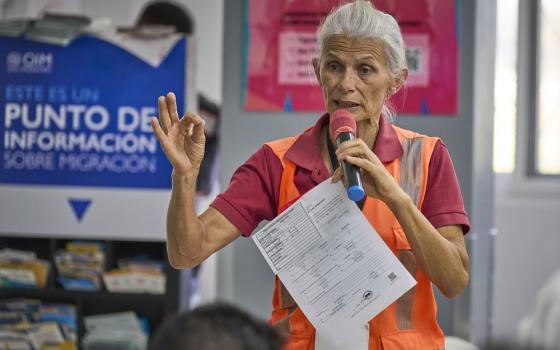
The logo for the Holy Year of Mercy is seen on a banner on the facade of St. Peter's Basilica at the Vatican Dec. 9, 2015. (CNS photo/Paul Haring)
"Welcome to the Year of Mercy. You're fired."
That may sound like Donald Trump doing pastoral ministry, but it is actually our church.
In November of 2015, just before the Jubilee Year of Mercy began, a part-time cantor was fired from his job at a large suburban parish in the archdiocese of Washington. The reason: it was discovered that he had entered into a same sex civil marriage with his partner. The archdiocese said that he gave scandal by a "public act contrary to the church's teaching."
The cantor was not an isolated case. All across the country in recent months there have been cases where church employees were fired or forced to resign because they either came out of the closet or they entered into a civil marriage.
This is going to be an increasingly common situation as thousands of gay Catholics enter into civil marriages all around the globe. There will doubtless be many more dismissals. Church authorities will rely on legalities such as contracts of employment. They will say that these relationships give scandal to the faithful and that such public sinners cannot hold positions of ministry in the church.
But is that true? Does a civil marriage really negate the church's teaching about sacramental marriage or does it merely offer protection of civil law? How does a same sex civil marriage give more scandal than heterosexual cohabitating, which is pandemic?
In this Year of Mercy, does law trump mercy? Wouldn't some effort at dialogue be a better reflection of the teaching of Christ? Jesus did not feel the need to condemn.
When it comes to same-sex relationships, I suspect the faithful are much more scandalized by the firing of otherwise well-behaved and competent employees, than they are by a same-sex relationship. In fact, the faithful seem to be able to discern that not all same-sex relationships are grave moral evil. Some relationships are avenues of grace.
This past month I saw an example of that when a gay man in our parish died. His name was Levi. He died from cancer and AIDS. Levi and his partner, Frank, came to our attention through our food bank, which they visited each week for food assistance.
Frank and Levi had been together for about 12 years. While they were not civilly married, they were very much committed to each other. Both of the men had been raised in very traditional Catholic families and had struggled for years with their sexual identity. Levi had been married for a while to a woman, which ended badly. Both felt rejected by their church.
When Levi's cancer spread to his bones, Frank quit his job as a heavy equipment operator to take care of his partner. Their financial condition, always precarious, deteriorated along with Levi's health. They went deeply into debt. They lost their apartment near Baltimore and had to stay with friends from the gay community. Eventually they became homeless. That was their low point.
A social worker stepped into to help. Since Levi was a veteran of the first Gulf War, he qualified for housing for homeless vets. The social worker found him an apartment in our parish near our local hospital. Frank was allowed to live in the apartment, listed as Levi's caregiver.
There was no sex in their relationship, just love. Their relationship had been platonic for years. Like heterosexual relationships, many gay relationships are much more about love than sex.
The volunteers in our food pantry discovered that Levi and Frank needed transportation to a hospital about 35 miles away, for chemotherapy. Several volunteered to drive them, which meant a day-long commitment, waiting at the hospital to bring them back.
On Christmas Day I made a plea, during the announcements at the early Mass, for a used car, so Frank could drive Levi to his treatments. The general manager of a car dealership was at Mass. On his way out of church he told me, "I'll find them a car." He didn't hesitate. When the employees of the dealership heard about the situation, they serviced and detailed the car for free and collected $500 to help pay for the inspection, title and tags. Our poor box fund paid the insurance.
At times, when Frank had to run an errand, parishioners would go over to sit with Levi, who was gradually going deaf and blind and was very anxious when Frank left him alone. Over the course of several months, I anointed Levi three times.
When Levi died, we had a new crisis. Since they were not civilly married, Frank had no authority to make decisions about burial. Moreover Frank almost was immediately required to move out of the apartment, since he was not a spouse, but only listed as "caregiver."
Levi's natural family provided no assistance. Worse, one brother showed up as Levi was dying to demand the title to the car.
Levi had no money and had left no instructions about his burial. He did not complete the form for cremation, so the crematorium would not accept his body.
I met with the local funeral director. We decided to do a traditional burial, which required no permission from the family. The funeral director donated her services. Our parish donated a plot in our cemetery and paid for the opening and closing of the grave and the concrete liner.
We had a lovely funeral. It was well attended by our parishioners and by some members of the gay community who came 65 miles from Baltimore. No family members came. Our funeral choir sang and our ushers and servers donated their services. Our funeral ministry, the Arimatheans, provided a meal afterward.
At the end of Levi's funeral, Frank spoke, humbly and quietly. Frank is a construction worker, more at home on a bulldozer than in the sanctuary. He said simply, "Levi and I loved each other. Because I loved him I did not care where we were, so long as we were together. Even when we became homeless, I did not care, so long as I was with him. When he became sick, I was happy if I could care for him. I was happy so long as I was with him. Now he is gone. My happiness is gone. But I thank you for helping us."
When Frank finished talking the church was completely silent. After the burial, one of the women from the choir said to me, "Don't we all wish we could have a love like that?"
In all of these last few months, no one ever said to me, "Hey Father, this is a gay couple, we shouldn't help them. They are public sinners. They are a public scandal."
Everyone in our community; social workers, police, hospice workers, funeral directors, cemetery workers, and parish volunteers treated Levi and Frank with respect, compassion and dignity. I am proud of the compassion of our parishioners. People in town told me they were impressed by the goodness of the parishioners. No one was scandalized by the relationship between Frank and Levi. They would have been scandalized if we had refused to help.
Jesus cured lepers and the man born blind. He ate and drank with prostitutes and tax collectors. His first reaction was always compassion. His harshest judgment was for the legalistic Pharisees. He told them, in Matthew 9:13, "Go and learn the meaning of the words, 'I desire mercy, not sacrifice. I did not come to call the righteous, but sinners.'"
The laity have a good grasp of this in the Year of Mercy.
[Fr. Peter Daly is the pastor of St. John Vianney parish in Prince Frederick, Md.]
Editor's note: We can send you an email alert every time Fr. Peter Daly's column, "Parish Diary," is posted to NCRonline.org. Go to this page and follow directions: Email alert sign-up.



